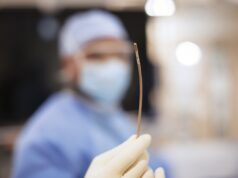
Interventional cardiologists at Northwestern Memorial Hospital, Chicago, USA have become the first in the mid-west of the USA, and the second nationally, to perform a minimally invasive tricuspid valve procedure using the Mitralign Trialign system.
The Trialign system is an investigational device designed to remove the need for open heart surgery in the repair a of “leaky” tricuspid heart valve.
“A minimally invasive approach to repairing leaky tricuspid heart valves addresses a serious unmet need,” says Stuart Rich, director of the Pulmonary Vascular Disease Program at Northwestern Medicine’s Bluhm Cardiovascular Institute and the principal investigator of the SCOUT study testing the Trialign system.
At Northwestern, the procedure was performed on 11 Feb 2016 by Charles Davidson, clinical chief of cardiology at Northwestern Memorial, and Mark Ricciardi, director of cardiac catheterisation at Northwestern Memorial. James Thomas, director of Bluhm’s Center for Heart Valve Disease, and Jyothy Puthumana, cardiologist, provided the critical imaging services for the procedure.
Instead of opening the chest to repair the valve through open heart surgery, interventional cardiologists using the Trialign system place catheters through two small openings in a vein in the neck to deliver surgical sutures, or threads, on each side of the tricuspid valve. The sutures are then pulled together to make the tricuspid valve opening smaller and reduce the regurgitation. Finally, the sutures are locked in place with a small stainless steel lock.
During the procedure, the physicians are guided by 3D imaging from two different cameras placed in and on the body.
Hospitalisation and recovery time for those receiving the procedure is anticipated to be only two days.
The Trialign system is an investigational device and is not approved by the US Food and Drug Administration.
Northwestern Memorial is one of four sites in the USA investigating Mitralign’s percutaneous tricuspid valve annuloplasty system (Trialign). The system is designed to offer an alternative to open heart surgery for those with functional tricuspid regurgitation.
The research study is looking to enrol up to 15 patients at the four sites around the country.













